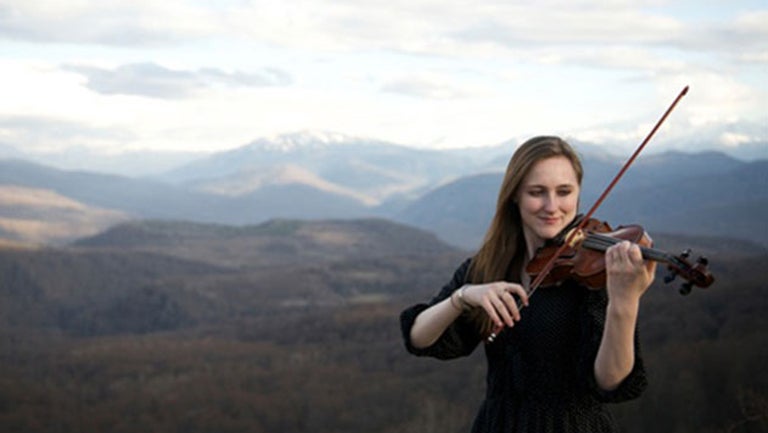Title: Student Violinist Creates Program for Young Musicians in Russia
This year’s McTighe Prize winner, Hannah Schneider (C’15), creates a Music from the Mountains program to help young classical musicians in the remote North Caucasus region of Russia record music and promote it for the world to hear.

Hannah Scheneider (C’15) will share how she launched a recording project to scout talent in the volatile North Caucasus region at Georgetown’s New Student Convocation Aug. 24.
She attended the Moscow Tchaikovsky Conservatory, and recorded an album this past spring of young musicians, ages 13-25, from the Republic of Adygea.
Traveling to Moscow – 17 hours away – or St. Petersburg – 26 hours away – for auditions proved too costly for many of the musicians, Schneider says.
“I knew that there was a lot of musical talent down there, and I knew that the region had the highest unemployment and the most terrorist attacks,” says the Georgetown Russian major from Hamden, Connecticut.
The program is called Music from the Mountains.
TURBULENT AREA
Russia fought two wars in the region against Chechen separatists in the first decade after the Soviet Union’s collapse in 1991.
Turbulence continues in the North Caucasus, home to about 40 ethnic groups and six nominally autonomous, ethnically non-Russian republics. Multiple bombings rattled Russia as just before the Winter Games in Sochi, where Schneider acted as a translator for various Olympic committees.
After Schneider decided to create Music from the Mountains to help the careers of young musicians in in the region, she quickly realized that a research survey wasn’t enough.
PARTNERSHIP WITH CARNEGIE HALL
In all, Schneider recorded 23 musicians this past spring and another 12 over the summer in different parts of the region. She also hosted workshops this summer to teach the musicians how to promote themselves as part of her project.
“We brainstormed about the different ways they can promote themselves and what it takes to make an album – making budgets and timelines,” she explains.
In addition to promoting the album in Russia, Schneider is partnering withCarnegie Hall’s Musical Exchange, a social network for aspiring musicians to “develop their talent with professional mentors.”
SUMMER FESTIVALS
Music from the Mountains is only the first step in a larger project, the Caucasus Vault Initiative, which will aim to enhance artistic and cultural exchange projects for youth in the Caucasus.
While making the album, Schneider found scholarships to send musicians to summer festivals in Europe.
“Going to summer festivals is really key for classical musicians in order to network [and] to get intensive training,” she explains. “If one musician gets out in the broader network of classical music … then word can spread that there’s a lot of talent [there].”
FUNDAMENTAL QUESTIONS
The Georgetown senior will address the incoming Class of 2018 this weekend as the McTighe Prize winner.
The prize, named for late longtime faculty member Thomas McTighe, is awarded each year to an outstanding undergraduate who has demonstrated achievement in scholarship and service to Georgetown and the community.
“College is the perfect time to ask ourselves the most fundamental questions: What kind of person do I want to be and what is the highest good in life?” says Schneider.
ADVICE TO FIRST-YEARS
Schneidersays she tries to make the most out of her time at the university, and hopes the incoming first-year students will do the same.
At Georgetown, she is a John Carroll Fellow, a 1789 Scholar, plays first violin in the Georgetown String Quartet –which she also manages – and serves as concertmaster of the Georgetown Symphony Orchestra.
Schneider also has served as editor-in-chief ofUtraque Unum, Georgetown’s undergraduate research journal.
“I really want [the first-year students] to think twice about why they’re here at Georgetown and what motivates their choices,” Schneider says. “A lot of freshmen are probably thinking that they are going to college in order to get a good job. That is certainly a part of college, but college really is the place to stop and think and grapple with the most imminent question – what sort of a life is worth living.”